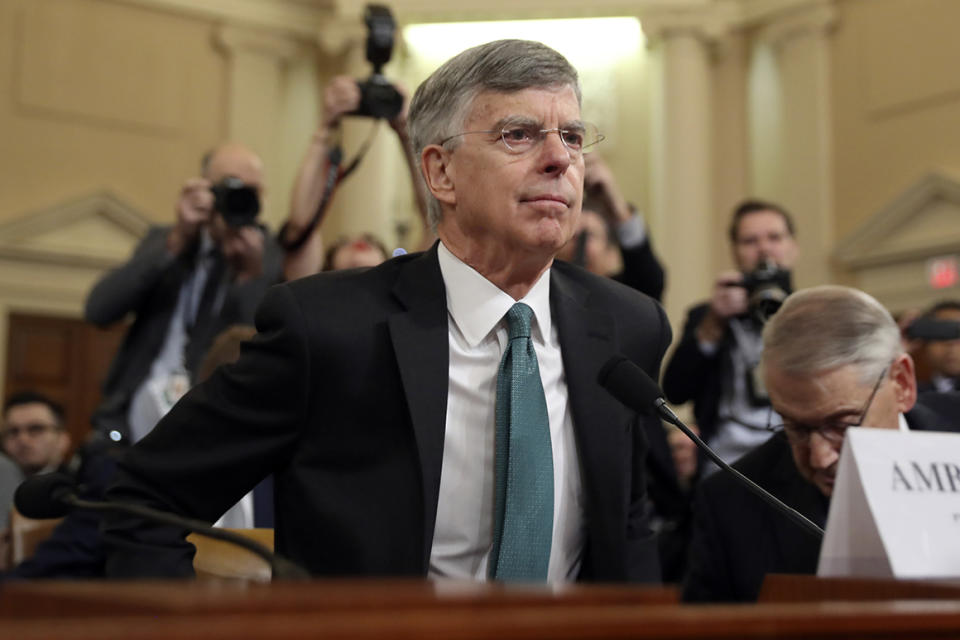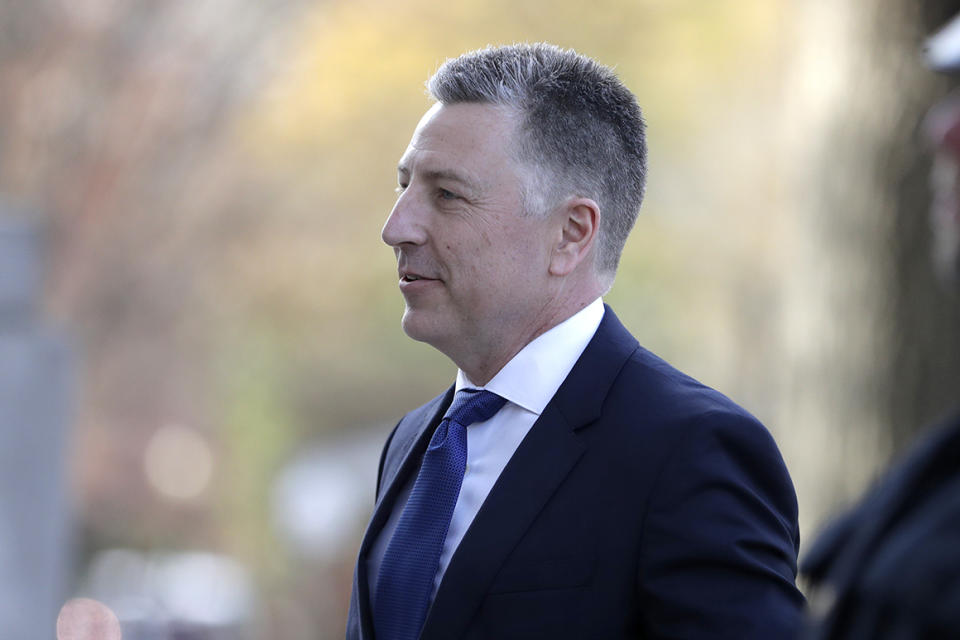Pompeo deputy’s first diplomatic crisis: Foggy Bottom
During Stephen Biegun’s ceremonial swearing in as the No. 2 official at the State Department, Secretary of State Mike Pompeo couldn’t help but gently rib him about his popularity in Washington.
Biegun, Pompeo noted, was confirmed by the Senate on 90-3 vote, a sign of the widespread, and bipartisan, respect for the secretary’s new deputy. Pompeo, on the other hand, squeaked by on a 57-42 vote, with numerous Democrats arguing he didn’t deserve to be the chief U.S. diplomat.
Pompeo’s quip got plenty of laughs, according to three people familiar with the Jan. 17 ceremony. But it also spoke to a larger point: Many inside and outside the State Department are looking to Biegun as the man who can repair some serious rifts in Washington.
Those rifts include the widening gulf between Pompeo and the career Civil and Foreign Service employees he leads, many of whom are unhappy with his handling of the Ukraine scandal that prompted President Donald Trump’s impeachment. It also includes the growing chasm between Pompeo and Democrats on Capitol Hill, many of whom view him as a partisan warrior concerned above all with keeping the president happy.
Biegun may be that rare bird in Washington capable of smoothing over, if not eliminating, the tensions. According to several current and former U.S. officials, Biegun is already making moves designed to present himself as both a healer and a risk-taker. He’s signaled that he wants to play a role in Ukraine policy — a near-toxic issue now at the State Department — and openly praised the rank and file.
“He has an enormous amount of good will and credibility coming into this position,” said Heather Conley, a former official in the George W. Bush administration. “But, of course, he comes in at an incredibly difficult moment.”
The 56-year-old Biegun has served in an array of roles in both the public and private sector, including as the executive secretary of the National Security Council during the second Bush administration.
He joined the Trump administration first as a special envoy for North Korea, leaving behind his job as vice president of international governmental relations for Ford Motor Company. His online State Department bio says he “has excelled in tough negotiating settings,” although he’s had little luck with the exceptionally tricky North Korea portfolio.
Biegun was officially sworn in as deputy secretary on Dec. 21 of last year. He took over from John Sullivan, a well-liked figure who was often seen a stabilizing force at the State Department but one with limited influence on Pompeo or Trump. Sullivan is now the U.S. ambassador to Russia.
In a Jan. 21 email to staffers, Biegun wrote that his “number one priority is supporting” the “people of the Department of State,” and that he wants the department to “take care of, grow, and retain talent.”
But the carefully worded missive also contained a subtle warning. While Biegun praised career employees, he also urged them to uphold an “ethos” statement unveiled by Pompeo months earlier and made clear that he was working in tandem with the secretary.
And while he stressed the importance of America’s international alliances, which Trump has dismissed in more than one way, he also mentioned the need to “advance the interests” of the United States — a line in tune with Trump’s “America First” foreign policy vision.
Biegun further wrote that he wanted to hear staffers’ views, “whether picking up a sandwich” in the department’s cafeteria or dropping by staff meetings in the various bureaus. Former and current department officials say he’s definitely shown up in the cafeteria, always a signal that you’re a man of the people at Foggy Bottom.
One person Biegun has met in the cafeteria was Eric Rubin, the president of the diplomats’ union, the American Foreign Service Association. Among other things, the union wants him to push Pompeo to appoint more career staffers to leadership roles and ambassadorships.
The dearth of career employees in positions such as assistant secretaries has contributed to the tensions between career staffers and Trump’s political appointees. Those tensions have spiked due to Pompeo’s unwillingness to publicly defend U.S. diplomats caught in the impeachment scandal.

One of those diplomats was William Taylor, the top U.S. official at the American Embassy in Kyiv who also testified in the impeachment inquiry. Pompeo ordered Taylor out of Ukraine before he visited the country last month. Taylor, however, attended Biegun’s ceremonial swearing in at the department’s headquarters, a person familiar with the event confirmed.
Brett Bruen, an outspoken former U.S. diplomat who now leads Global Situation Room, a strategic communications firm, said Foreign Service officers know that Biegun is limited in what he can accomplish. Still, they hope that he can act as a “strain that tries to filter out the wackiest ideas from Pompeo, Trump” and others in the administration.
Some career State Department staffers say they might have higher hopes for Biegun if Pompeo leaves and Biegun takes over as the acting secretary. Many expected that would happen as Pompeo mulled running for a Kansas Senate seat. But the secretary has ruled out that run and appears likely to stay at State for the foreseeable future.
A former George W. Bush administration official who has worked with Biegun warned career staffers that they might rue the day they lose Pompeo. After all, Pompeo retains Trump’s ear and confidence, despite running a department viewed by many Republicans as a liberal bastion.
Biegun doesn’t have that sort of access to or influence on Trump, and he’s not a confrontational person. Given Trump’s tendency to go by his instinct and ignore outside counsel, Biegun as “acting secretary” would be uniquely powerless, the former official predicted.
“At the end of the day he’s constrained by the fact that he’s working in the Trump administration, too,” the former official said. “In the Trump administration you need to pick your battles carefully.”
Biegun did not respond to a request for an interview.
He has indicated in private settings that he wants to get involved in Ukraine policy, a highly sensitive topic given its role in Trump’s impeachment, current and former U.S. diplomats say.

In particular, he’s eyeing the duties once assigned to Kurt Volker, the former special envoy who was tasked with trying to end Ukraine’s war with Russia in the Donbass region. Volker quit that position as Democrats’ impeachment inquiry ramped up, testifying in the process and handing over a key set of texts that were particularly damaging to Trump.
In a recent op-ed, Volker urged Pompeo to name Biegun as the “point person” for Ukraine negotiations. Others in the foreign policy establishment have echoed that recommendation. Because the U.S. at present does not have an ambassador in Kyiv, there’s a leadership vacuum on that issue.
Biegun is unlikely to take on a formal Ukraine-related title. But he has experience and many contacts in that part of the world; in the 1990s, he worked in Moscow for the International Republican Institute, a democracy building organization funded by the U.S. government. He studied Russian while attending the University of Michigan.
Biegun also intends to keep the portfolio he’d earlier had under Trump: U.S. special representative for North Korea. He’s held that position since August 2018, and U.S. officials says it makes sense for him to retain it given how long he’s worked to learn the issues and build connections in the region.
That being said, despite three face-to-face meetings between Trump and North Korean dictator Kim Jong Un, the U.S. has made no real progress in convincing North Korea to abandon its nuclear weapons.
The North Koreans prefer to deal directly with Trump, making the job of the special representative near-impossible, no matter who holds it. There’s some hope that Biegun’s elevation to deputy secretary might entice Pyongyang to take him more seriously, but observers say it’s unlikely to make much difference.
But there’s one Trump adversary Biegun might have more success in dealing with: the Democrats in Congress.
That relationship has long been sour under Pompeo, who has been unable — or unwilling — to shed his image on the Hill as a highly partisan congressman from Kansas. His refusal to hand over State Department documents and attempts to block witnesses during the impeachment inquiry has only deepened anger against him.
More recently, he’s rebuffed requests to testify on the Hill on non-impeachment issues.
Current and former U.S. diplomats say Pompeo should dispatch Biegun as often as possible to the Hill to help right the relationship. That’s especially the case in the House, which is controlled by Democrats. Just this week, Biegun helped brief lawmakers on the U.S. response to the coronavirus outbreak.
“At this point, I would send the local dogcatcher to the Hill rather than Pompeo,” one ex-diplomat said.

